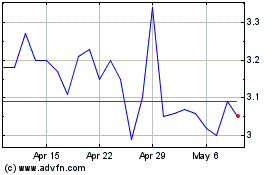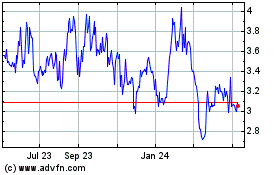Ovid Therapeutics Receives Orphan Drug Designation from the European Commission for OV101 for the Treatment of Angelman Syndr...
July 02 2019 - 8:00AM

Ovid Therapeutics Inc. (NASDAQ: OVID), a biopharmaceutical company
committed to developing medicines that transform the lives of
people with rare neurological diseases, today announced that the
European Commission (EC) has granted orphan drug designation (ODD)
to OV101 (gaboxadol) for the treatment of Angelman syndrome based
on the results of the Phase 2 STARS trial. OV101 is believed to be
the only delta (δ)-selective GABAA receptor agonist in clinical
development for the treatment of certain neurodevelopmental
disorders, including Angelman syndrome.
“We are proud to be granted Orphan Drug Designation by the
European Commission. This is another important step and further
validates the potential of OV101 to be a meaningful treatment
option for those living with Angelman syndrome around the world,”
said Amit Rakhit, MD, MBA, Chief Medical Officer and Head of
Research & Development at Ovid. “Today, there are no approved
medicines specifically for Angelman syndrome. Ovid previously
received Orphan Drug and Fast Track designation for OV101 from the
U.S. Food and Drug Administration (FDA). We recently announced we
have initiated the pivotal Phase 3 NEPTUNE trial in Angelman
syndrome and have a clear route to registration, if positive.”
Dr. Rakhit continued, “It is believed that in the U.S. there are
approximately 24,000 individuals with Angelman syndrome and a
similar number in the European Union. OV101 is the only medicine
currently in clinical development for Angelman syndrome. It’s our
intent for OV101 to be the first medicine to be approved for this
important and underserved community.”
About Orphan Drug Designation by the European Medicines
AgencyAbout 30 million people in the European Union (EU)
live with a rare disease. ODD in the EU is granted by the EC based
on a positive opinion by the European Medicines Agency’s (EMA)
Committee for Orphan Medicinal Products (COMP) to companies
developing therapies to diagnose, prevent or treat a rare disease.
To qualify for ODD, a potential medicine must target a
life-threatening or chronically debilitating disease that affects
no more than 5 in 10,000 persons in the EU. Additionally, the
investigational medicinal product must either provide a significant
benefit over existing therapies or provide a treatment for patients
for whom existing therapies do not work or exist. The designation
enables a company to benefit from incentives in the EU, such as
reduced fees, centralized authorization and protection from
competition for ten years once the medicine is approved for
marketing.
About Angelman Syndrome Angelman syndrome is a
rare genetic disorder that is characterized by a variety of signs
and symptoms. Characteristic features of this disorder include
delayed development, intellectual disability, severe speech
impairment, problems with movement and balance, seizures, sleep
disorders and anxiety. The most common cause of Angelman syndrome
is the loss of function of the gene that codes for ubiquitin
protein ligase E3A (UBE3A), which plays a critical role in nerve
cell communication, resulting in impaired tonic inhibition.
Individuals with Angelman syndrome typically have normal lifespans
but are unable to live independently, therefore, they require
constant support from a network of specialists and caregivers.
Angelman syndrome affects approximately 1 in 12,000 to 1 in 20,000
people globally.
There are no approved therapies for Angelman syndrome, and
treatment primarily consists of behavioral interventions and
pharmacologic management of symptoms.
Angelman syndrome is associated with a reduction in tonic
inhibition, a function of the delta (δ)-selective GABAA receptor
that allows a human brain to decipher excitatory and inhibitory
neurological signals correctly without being overloaded. If tonic
inhibition is reduced, the brain becomes inundated with signals and
loses the ability to separate background noise from critical
information.
About OV101 OV101 (gaboxadol) is believed to be
the only delta (δ)-selective GABAA receptor agonist in
development and the first investigational drug to specifically
target the disruption of tonic inhibition, a central physiological
process of the brain that is thought to be the underlying cause of
certain neurodevelopmental disorders. OV101 has been demonstrated
in laboratory studies and animal models to selectively activate the
δ-subunit of GABAA receptors, which are found in the
extrasynaptic space (outside of the synapse), and thereby impact
neuronal activity through tonic inhibition.
Ovid is developing OV101 for the treatment of Angelman syndrome
and Fragile X syndrome to potentially restore tonic inhibition and
thereby address the core symptoms of these disorders. In both of
these syndromes, the underlying pathophysiology includes disruption
of the tonic inhibition modulated through the δ-subunit of
GABAA receptors. In preclinical studies, it was observed that
OV101 improved symptoms of Angelman syndrome and Fragile X
syndrome. This compound has also previously been tested in over
4,000 patients (over 1,000 patient-years of exposure) and was
observed to have favorable safety and bioavailability profiles. In
2018, Ovid announced the successful completion of its Phase 2 STARS
trial of OV101 in adults and adolescents with Angelman syndrome.
Ovid expects to enroll the first patients in the pivotal Phase 3
(NEPTUNE) clinical trial in children aged 4-12 years old with
Angelman syndrome during the third quarter of 2019. In addition,
Ovid is conducting a Phase 2 clinical trial (ROCKET) in Fragile X
syndrome, with results expected around year-end 2019 or early
2020.
The FDA has granted Orphan Drug and Fast Track
designations for OV101 for both the treatment of Angelman syndrome
and Fragile X syndrome.
About Ovid TherapeuticsOvid Therapeutics
(NASDAQ: OVID) is a New York-based biopharmaceutical company using
its BoldMedicine™ approach to develop medicines that transform the
lives of patients with rare neurological disorders. Ovid has a
broad pipeline of potential first-in-class medicines. The company’s
most advanced investigational medicine, OV101 (gaboxadol), is
currently in clinical development for the treatment of Angelman
syndrome and Fragile X syndrome. Ovid is also developing OV935
(soticlestat) in collaboration with Takeda Pharmaceutical Company
Limited for the potential treatment of rare developmental and
epileptic encephalopathies (DEE).
For more information on Ovid, please visit
http://www.ovidrx.com/.
Forward-Looking Statements This press release
includes certain disclosures that contain “forward-looking
statements,” including, without limitation, statements regarding
advancing Ovid’s product candidates, progress, timing, scope and
results of clinical trials for Ovid’s product candidates, and the
reporting of clinical data regarding Ovid’s product candidates. You
can identify forward-looking statements because they contain words
such as “will,” “believes” and “expects.” Forward-looking
statements are based on Ovid’s current expectations and
assumptions. Because forward-looking statements relate to the
future, they are subject to inherent uncertainties, risks and
changes in circumstances that may differ materially from those
contemplated by the forward-looking statements, which are neither
statements of historical fact nor guarantees or assurances of
future performance. Important factors that could cause actual
results to differ materially from those in the forward-looking
statements are set forth in Ovid’s filings with the Securities and
Exchange Commission under the caption “Risk Factors”. Ovid assumes
no obligation to update any forward-looking statements contained
herein to reflect any change in expectations, even as new
information becomes available.
Contacts
Investors and Media:Ovid Therapeutics
Inc.Investor Relations & Public Relationsirpr@ovidrx.com
Or
Investors: Steve KlassBurns McClellan,
Inc.sklass@burnsmc.com (212) 213-0006
Media: Jenn GordonSpectrum Science
Communicationsjgordon@spectrumscience.com(202) 587-2580
Ovid Therapeutics (NASDAQ:OVID)
Historical Stock Chart
From Mar 2024 to Apr 2024

Ovid Therapeutics (NASDAQ:OVID)
Historical Stock Chart
From Apr 2023 to Apr 2024
